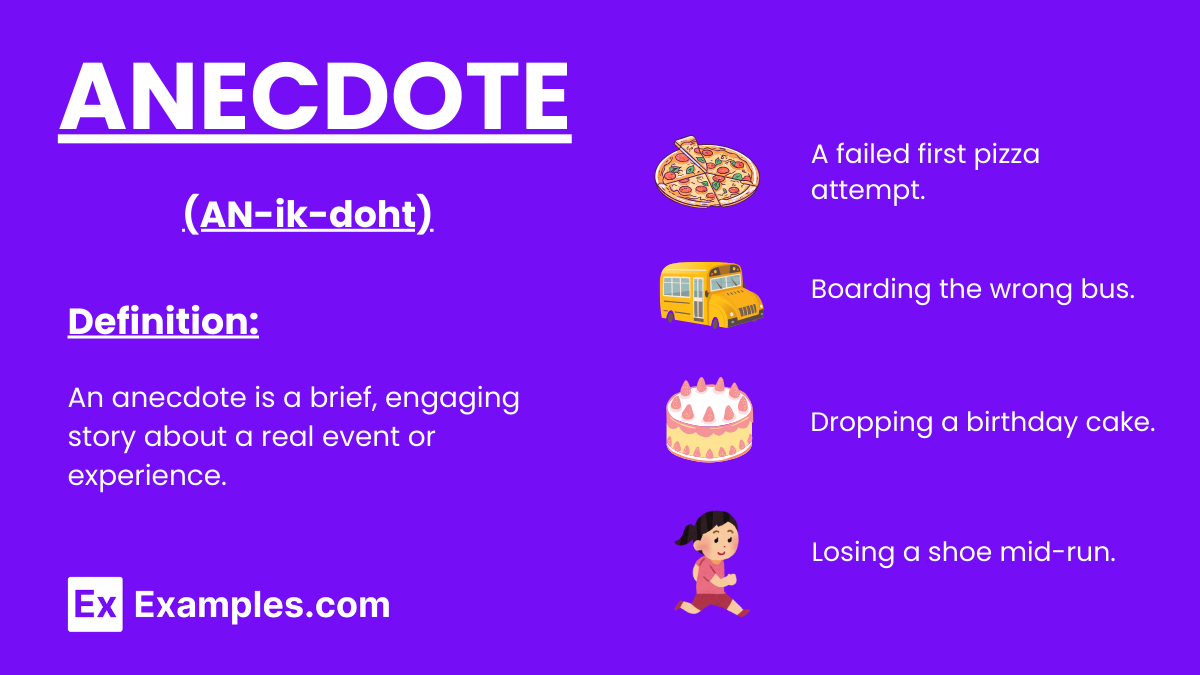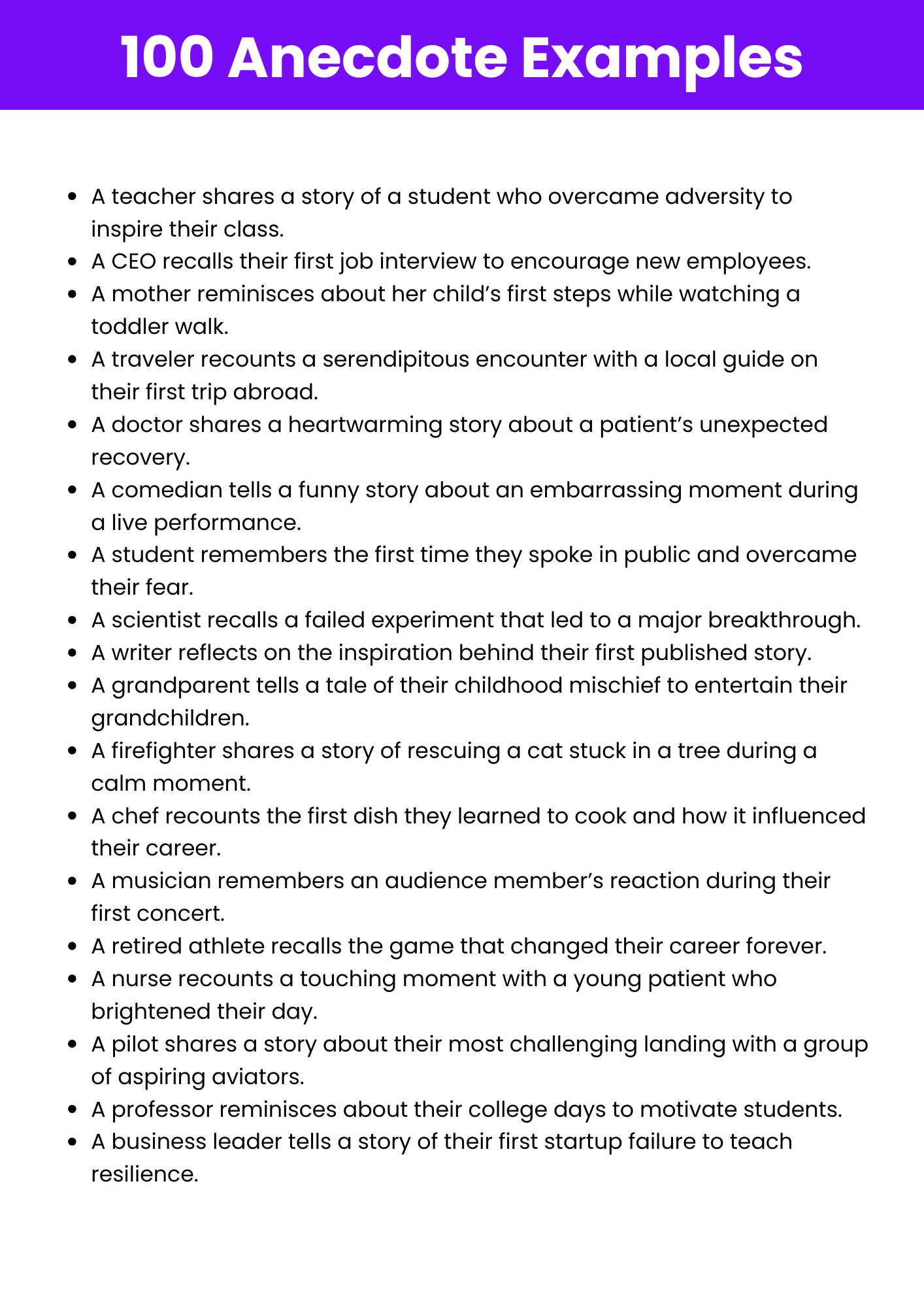Anecdote
What is Anecdote? – Definition
An anecdote is a short, engaging story or personal account often used to illustrate a point, entertain, or provide insight into a situation or character.

Generated Anecdote Examples

Download Anecdote Examples
Enhance your understanding with our comprehensive PDF guide.
Download PDFExamples of Anecdotes
- A teacher sharing a story about a student who overcame struggles.
- A chef recalling their first attempt at a signature dish.
- A pilot recounting an emergency landing experience.
- A pet owner describing how their pet saved the day.
- A motivational speaker telling a story of their first failure.
- A photographer sharing a memorable moment from a photo shoot.
- An athlete recalling the game that inspired their career.
- A speaker narrating an event that shaped their worldview.
- A homeowner recounting the challenges of their first renovation project.
- A traveler describing an unexpected adventure during a trip.
- A sailor sharing a story about surviving a storm at sea.
- A librarian recalling the day a rare book was discovered.
- A coach narrating a memorable practice session.
- A nurse sharing a story about a life-saving moment.
- A museum guide describing an artifact’s unique history.
- A lifeguard recounting a daring rescue.
- A scientist narrating a breakthrough experiment.
- An actor recalling a funny mishap during a play.
- A singer sharing the story of their first public performance.
- A runner recalling a moment of perseverance in a marathon.
- A celebrity sharing a story about their early struggles.
- An inventor narrating the inspiration for their creation.
- A conservationist sharing a story about rescuing wildlife.
- A tenant describing their first apartment experience.
- A hiker narrating a close encounter with wildlife.
- A filmmaker sharing a behind-the-scenes moment from a shoot.
- An astronaut narrating the day they saw Earth from space.
- A park ranger recounting a memorable visitor interaction.
- An author recalling their journey to publishing their first book.
- A historian narrating the discovery of a historical site.
Types of Anecdotes
Personal Anecdotes
Stories based on personal experiences to illustrate a point.
- A teacher sharing how they overcame a learning challenge.
- A parent recounting a memorable family vacation.
- A pet owner narrating how their dog saved the day.
- An athlete sharing the story of their first championship win.
- A traveler describing a life-changing trip abroad.
Inspirational Anecdotes
Stories that motivate or uplift the audience.
- A student narrating how they achieved their dream despite obstacles.
- A scientist recounting their journey to a breakthrough discovery.
- A speaker sharing a story of resilience after failure.
- An astronaut describing their first space mission.
- A health coach recounting their personal fitness transformation.
Humorous Anecdotes
Light-hearted stories that amuse and entertain.
- A comedian narrating a hilarious travel mishap.
- A pet owner recalling a funny incident with their mischievous cat.
- An actor sharing a blooper during a stage performance.
- A child narrating an amusing misunderstanding in class.
- A coach telling a funny story from a chaotic practice session.
Historical Anecdotes
Stories from history used to provide context or insight.
- A historian narrating a pivotal moment from the Civil Rights Movement.
- A lawyer recounting a landmark case that shaped legal precedent.
- A teacher narrating the story of the first moon landing.
- A guide sharing a tale about a famous artifact’s discovery.
- A geographer describing the impact of a historical natural disaster.
Professional Anecdotes
Stories related to experiences in professional environments.
- A manager recounting a challenging team project.
- An engineer sharing the story of solving a complex problem.
- A CEO narrating the early struggles of their company.
- A doctor narrating a unique case they encountered.
- A factory worker describing an innovative solution to a production issue.
Moral Anecdotes
Stories that convey a moral or life lesson.
- A story about honesty learned during childhood.
- A teacher narrating a lesson about perseverance from their life.
- A conservationist sharing a tale about the value of preserving nature.
- A monk narrating a story about inner peace.
- A parent sharing a lesson about compassion and kindness.
How to Identify and Understand Anecdotes?
Identifying anecdotes involves recognizing short, engaging stories or examples shared to illustrate a point, entertain, or convey a message.
- Look for brief narratives that support or emphasize a larger idea.
- Note the purpose behind the story, whether it is to entertain, teach, or persuade.
- Identify personal experiences or examples shared in conversations or texts.
- Focus on stories that highlight specific moments, emotions, or lessons.
- Analyze how the anecdote connects to the overall context or argument.
How to Use Anecdotes?
Using anecdotes effectively involves sharing concise, relevant, and engaging stories to support arguments, connect with the audience, or provide insight.
- Choose anecdotes that are directly related to the topic or message.
- Keep anecdotes brief and focused to maintain audience interest.
- Use personal experiences to build trust and relatability with the audience.
- Deliver anecdotes with clarity and emotion to enhance impact.
- Ensure the anecdote reinforces the main point or theme of your content.
Other Examples of Anecdotes
Educational Anecdotes
Stories shared to teach a lesson or concept.
- A teacher narrating a story about a student who excelled through perseverance.
- A lecturer sharing an example of a historical figure to explain leadership.
- A professor describing a famous experiment to illustrate a psychological principle.
- A coach recounting a practice session that led to a championship win.
- A mentor sharing a personal story to motivate students.
Philosophical Anecdotes
Stories that provoke thought or explore deep questions.
- A philosopher sharing a parable to illustrate the concept of justice.
- A monk recounting an experience to explain mindfulness.
- A speaker narrating a story to delve into the meaning of happiness.
- A traveler describing a profound realization while exploring nature.
- A mentor sharing a story that challenges assumptions about success.
Cultural Anecdotes
Stories that reflect cultural traditions, values, or experiences.
- A traveler sharing a story about a unique festival in a foreign country.
- A family recounting a memorable holiday tradition.
- A storyteller narrating a folk tale passed down through generations.
- A chef sharing the history of a traditional dish.
- A community leader recounting a significant cultural event.
Health Anecdotes
Stories shared to inspire or inform about health and wellness.
- A patient recounting their recovery journey after a major illness.
- A fitness trainer sharing their personal transformation story.
- A nutritionist narrating the benefits of adopting a healthy diet.
- A yoga instructor describing how mindfulness helped overcome anxiety.
- A mental health advocate sharing their journey of resilience.
Travel Anecdotes
Stories that highlight unique experiences or lessons learned while traveling.
- A backpacker sharing their adventures in the Himalayas.
- A traveler narrating a life-changing encounter with a local guide.
- A hiker recalling the beauty of witnessing a sunrise from a mountain peak.
- A tourist narrating their amusing experience in a foreign market.
- A diver recounting their thrilling underwater adventures.
Environmental Anecdotes
Stories that inspire or raise awareness about nature and the environment.
- An activist sharing a story about restoring a local park.
- A gardener narrating their journey of creating a sustainable garden.
- A forest ranger sharing an encounter with wildlife.
- A campaigner recounting efforts to clean a polluted river.
- A marine biologist sharing a story about saving endangered sea turtles.
Explore Other Literary Devices
Elevate Your AP English Preparation
Unlock your potential with our comprehensive AP English exam preparation tools designed to help you excel.
- Extensive Question Bank: Access 900+ exam-like questions for both AP English Language and Literature.
- Expertly Crafted: Questions mirror the structure and difficulty of actual AP exams, ensuring relevant practice.
- Detailed Explanations: Understand your mistakes with clear, concise breakdowns of correct and incorrect answers.
- Personalized Learning: Tailor your study sessions with topic-specific tests and adaptive learning tools.
- Comprehensive Coverage: Master all aspects of the AP English curriculum with extensive guides and resources.
Frequently Asked Questions
-
What is an anecdote?
An anecdote is a short, often amusing or insightful story about a real person, event, or experience, used to illustrate a point or engage an audience. -
Why are anecdotes used in communication?
Anecdotes make communication more relatable, engaging, and memorable by providing real-life examples or personal experiences. -
How can anecdotes enhance storytelling?
Anecdotes add depth, emotion, and context to stories, making them more impactful and connecting with the audience on a personal level. -
Can anecdotes be fictional?
While most anecdotes are based on real events, fictional anecdotes can be used as illustrative tools to convey lessons or insights. -
What makes an anecdote effective?
An effective anecdote is concise, relevant to the topic, and emotionally engaging, often ending with a clear takeaway or lesson. -
Where can anecdotes be used?
Anecdotes are versatile and can be used in speeches, articles, education, business presentations, or casual conversations to illustrate points or entertain. -
How do anecdotes help in teaching?
Anecdotes make lessons more relatable and memorable by linking theoretical concepts to real-life examples or experiences. -
Are anecdotes always humorous?
No, anecdotes can be humorous, emotional, or thought-provoking, depending on the purpose and audience. -
How can I use anecdotes in writing?
Use anecdotes to introduce topics, provide examples, or support arguments, ensuring they are concise and relevant to your main point. -
Can anecdotes be used in professional anecdotes?
Yes, anecdotes are valuable in professional anecdotes to illustrate points, build rapport, or make presentations and discussions more engaging.

